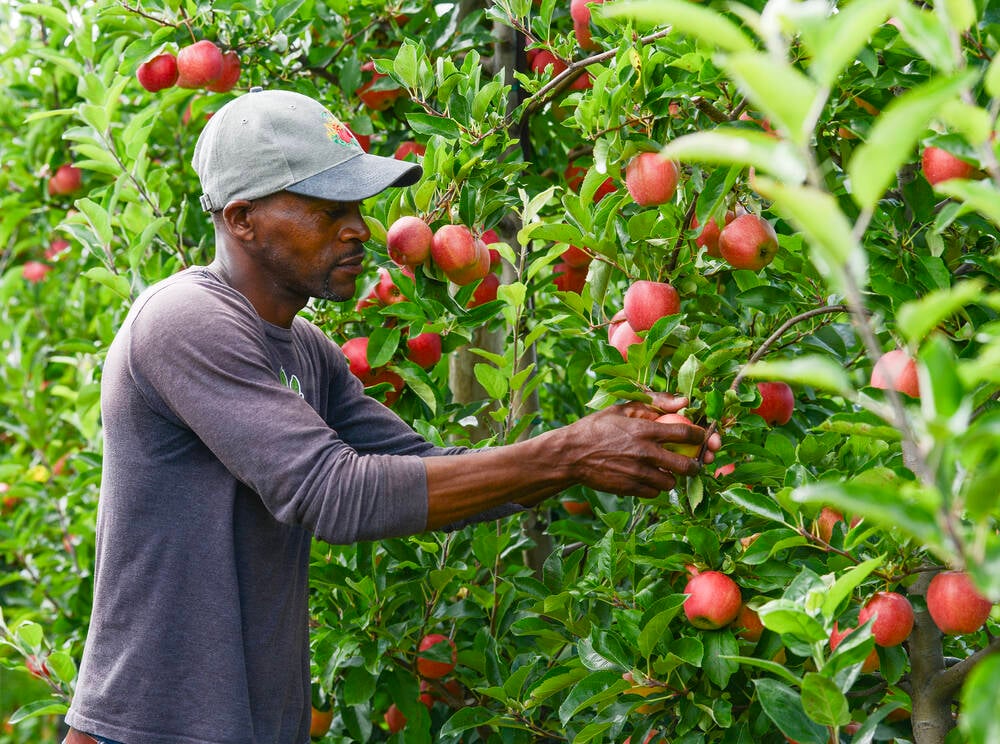Feds add stringent measures to discourage temporary foreign worker reliance

The federal government is changing Canada’s temporary foreign worker programs to reduce the use of migrant workers in Canada.
That could affect the agriculture sector, though it’s not a direct target of the reforms.
“Bad actors are taking advantage of people and compromising the program for legitimate businesses. We are putting more reforms in place to stop misuse and fraud from entering the Temporary Foreign Worker Program,” said Randy Boissonnault, minister of employment, workforce development and official languages, in an Aug. 6 news release.
Read Also

Marketing initiative bears fruit for Ontario tender fruit growers
The province has invested up to $1.6 million over four years in purchasing Foodland Ontario branded bins for locally grown…
The reforms include:
• Enforcing the 20 per cent cap policy for temporary foreign workers, including those in the “dual intent sub-stream.”
• Applying stricter oversight in “high-risk areas” when processing Labour Market Impact Assessments and conducting inspections and “considering” LMIA fee increases.
• Looking to implement “future regulatory changes” regarding employer eligibility, like a minimum number of years in business or the employer’s history of layoffs.
Why it matters: TFW numbers have risen dramatically in recent years, prompting calls for new and more robust overs ight of the program.
“Our preliminary understanding of the announcement is that it is largely targeted at non-agricultural sectors,” said Bill George, labour section chair for the Ontario Fruit and Vegetable Growers Association, though he also noted there could be effects on the farm.
“Any increase in inspection rigour will affect all sectors, including agriculture.”
Employment and Social Development Canada protects the health and safety rights of TFWs outlined under federal regulations. Last year, the ESDC found that 94 per cent of the 2,122 employers inspected across all sectors were compliant. However, it levied $2.1 million in administrative fines, a 36 per cent increase over the previous fiscal year.
ESDC also banned 12 employers from the program between April 1, 2023, and March 31, 2024, 12 of them for violating TFW program conditions. One was issued a 10-year ban and a $135,000 fine for failing to provide an abuse-free environment and documents.
Additionally, it slapped a food service employer with a two-year ban and a $152,000 fine for breaking government hiring and recruiting laws, improper pay and working conditions, among other violations.
In another case, ESDC issued a five-year ban and a $46,000 penalty on an ag sector employer for failing to provide proper documentation to the inspector and inaccurate job descriptions on the LMIA application.
The Seasonal Agricultural Workers Program (SAWP) falls under the TFW umbrella and is vetted yearly by Canadian and participating governments. Before finalizing renewals, requested adjustments are made to the agreements, explained Ken Forth, president of the Foreign Agricultural Resource Management Service, which manages SAWP applications.
“It’s a good program, and I think the government is realizing that,” he said. “I think they want to take some of our rules and start to implement them in the other system.”
Workers in the SAWP have the same rights and regulations as Canadian workers, along with benefit from the Refugee Protection Act, Forth noted.
“If somebody’s abusing the program, kick them off the damn program,” Forth said. “I’ll say that loud and clear anywhere. If you want to abuse anybody, maybe you should find another line of work.”
Forth said employers are removed from the SAWP program in two ways. The Integrity Branch of Service Canada can stop a labour market impact assessment, though that is rare. As well, the participating country’s liaison officer can veto an employer due to complaints about poor working conditions or abuse, which happens occasionally.
“They (the country liaison) call us and say we’re not going to supply workers to that farm, and it’s over,” he said. “There’s no process; they have investigated and aren’t supplying workers.”
According to the Aug. 6 news release, Boissonnault told business associations that he may implement a “refusal to process” under the low wage stream to prevent employers from accessing TFWs in certain areas and industries.
According to a Statistics Canada report published in May, one in 10 TFWs made less than $7,500 annually in 2019. However, the program’s 500 job categories span health care, construction, hospitality and service industries, agriculture and food processing, to name a few.
Stefan Larass, the vegetable growers’ senior policy advisor, said TFWs hired through the low- and high-wage streams account for less than two per cent of his sector’s workforce. Most come through dedicated agricultural streams.
SAWP employees are guaranteed to be paid the provincial minimum wage or higher. Ontario workers’ earnings start at $16.71 an hour plus free housing, which, when added up, equals $20 to $23 an hour, Forth said.
“While the majority of employers use the program for its intended purpose, more work is required to protect the Canadian labour market and hold bad actors accountable,” the news release stated.
“The Minister will closely monitor employer demand for the TFW Program, as well as the employment rate, and is willing to take further tightening measures where required.”
Last year, 239,646 TFW applications were approved, more than double the number in 2018, and 2022 saw an increase of more than 89,000 from the previous year.
In March, the federal government announced that some sectors, including food processing and food service, would be allowed to employ TFWs as no more than 20 percent of their workforce, down from 30 percent in 2022 and 2023, to reduce Canada’s reliance on foreign workers.
The meat processing sector said this would add to its already significant workforce challenges and denied it was overly reliant on TFWs.
–With files from Geralyn Wichers
Source: Farmtario.com

